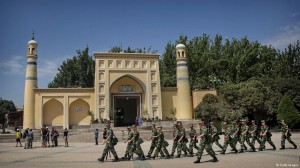Chinese extremists in Xinjiang are fleeing overseas to fight with Isis in Iraq and Syria and then returning to take part in plots at home, state officials in China have claimed.
Authorities in the far-western region of Xinjiang, which borders Afghanistan and Pakistan, announced plans to strengthen their crackdown on terrorism and extremism at a discussion on the sidelines of the third session of the 12th National People’s Congress (NPC), according to the Associated Press.
 Xinjiang has seen repeated violence as Uighurs have bristled under what they say is repressive Chinese government rule. Deadly attacks in other parts of the country have also been blamed on Uighurs.
Xinjiang has seen repeated violence as Uighurs have bristled under what they say is repressive Chinese government rule. Deadly attacks in other parts of the country have also been blamed on Uighurs.
“There are Uighurs that have fled overseas and joined Isis,” Zhang Chunxian, Communist Party secretary of Xinjiang, said on Tuesday. “The organisation (Isis) has a huge international influence and Xinjiang can’t keep aloof from it and we have already been affected. We have also found that some who fought returned to Xinjiang to participate in terrorist plots.”
He did not provide any detail of the alleged plots.
The claim comes after Mr Chunxian announced on Tuesday that militants from Xinjiang who travelled to fight with Isis were arrested on their return to China.
“I believe there are extremists from Xinjiang who have joined Islamic State,” he was quoted as saying by the South China Morning Post.
“We have recently arrested some groups who returned [to Xinjiang] after joining the group.”
Beijing has previously blamed the violence on Islamic militants with foreign connections who are seeking an independent state in Xinjiang, but has offered little evidence and ignored calls for independent investigations.
Uighur groups say police have used indiscriminate deadly force against people protesting the government’s policies in the region.
The Global Times, a newspaper affiliated with the ruling Communist Party, said in December that about 300 Chinese are fighting alongside Isis in territories under their control.
Raffaello Pantucci, a London-based terrorism researcher at the defence think tank Royal United Services Institute, said it was possible that people from Xinjiang had fought in Syria and Iraq and with Isis.
However, he said their return was less likely. “Whether individuals are able to make the journey all the way back seems difficult, especially given the difficulty people from Xinjiang seem to have in getting passports,” he added.
Isis now has up to 20,000 foreign fighters, according to US intelligence. An estimated 3,400 of these fighters travelled from Western nations to Isis strongholds in Iraq and Syria.

Leave a Reply